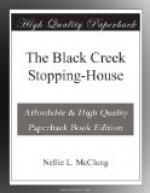These and other kindred reports filled the Committee with apprehension.
The most unmoved member of the company was the redoubtable Tom himself, who, stretched upon the slippery black leather lounge, hoarse as a frog from much addressing of obdurate electors, was endeavoring to sing “Just Before the Battle, Mother,” hitting the tune only in the most inconspicuous places!
The Secretary, with the list in his hand, went over the names:
“Jim Stewart—Jim’s solid; he doesn’t want Reciprocity, because he sent to the States once for a washing-machine for his wife, and smuggled it through from St. Vincent, and when he got it here his wife wouldn’t use it!
“Abe Collins—Abe’s not right and never will be—he saw Sir Wilfrid once—
“John Thomas Green—say, how about Jack? Surely we can corral Jack. He’s working for you, Milt, isn’t he?” addressing one of the scrutineers.
“Leave him to me,” said Milt, with an air of mystery; “there’s no one has more influence with Jack than me. No, he isn’t with me just now, he’s over with my brother Angus; but when he comes in to vote I’ll be there, and all I’ll have to do is to lift my eyes like this” (he showed them the way it would be done) “and he’ll vote—right.”
“How do you know he will come, though?” asked the Secretary, who had learned by much experience that many and devious are the bypaths which lead away from the polls!
“Yer brother Angus will be sure to bring him in, won’t he, Milt?” asked John Gray, the trusting one, who believed all men to be brothers.
There was a tense silence.
Milt took his pipe from his mouth. “My brother Angus,” he began, dramatically, girding himself for the effort—for Milt was an orator of Twelfth of July fame—“Angus Kennedy, my brother, bred and reared, and reared and bred, in the principles of Conservatism, as my poor old father often says, has gone over—has deserted our banners, has steeped himself in the false teachings of the Grits. Angus, my brother,” he concluded, impressively, “is—not right!”
“What’s wrong with him?” asked Jim Grover, who was of an analytical turn of mind.
“Too late to discuss that now!” broke in the Secretary; “we cannot trace Angus’s downfall, but we can send out and get in John Thomas. We need his vote—it’s just as good as anybody’s.”
Jimmy Rice volunteered to go out and get him. Jimmy did not believe in leaving anything to chance. He had been running an auto all week and would just as soon work at night as any other time. Big Jack Moore, another enthusiastic Conservative, agreed to go with him.
When they made the ten-mile run to the home of the apostate Angus, they met him coming down the path with a lantern in his hand on the way to feed his horses.
They, being plain, blunt men, unaccustomed to the amenities of election time, and not knowing how to skilfully approach a subject of this kind, simply announced that they had come for John Thomas.




